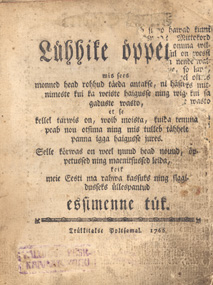
Lühhike öppetus
Encyclopedia

Periodical publication
Periodical literature is a published work that appears in a new edition on a regular schedule. The most familiar examples are the newspaper, often published daily, or weekly; or the magazine, typically published weekly, monthly or as a quarterly...
in the Estonian language
Estonian language
Estonian is the official language of Estonia, spoken by about 1.1 million people in Estonia and tens of thousands in various émigré communities...
. Edited by Dr. Peter Ernst Wilde
Peter Ernst Wilde
Peter Ernst Wilde was a Baltic German physician and Enlightenment era Estophile....
and printed for a short while in 1766–1767, it described various simple medical techniques intended to be usable in the field by peasants.
The full title of the newspaper was Lühhike öppetus mis sees moned head rohhud täeda antakse, ni hästi innimeste kui ka veiste haigusse ning viggaduste vasto, and it can be translated as Brief instruction announcing some good medicine, both for human and bovine ailments and traumas. It was printed weekly, with each issue having four pages. A total of 41 issues were printed.
August Wilhelm Hupel
August Wilhelm Hupel
August Wilhelm Hupel was a Baltic German publicist, estophile and linguist....
was responsible for translating the content to Estonian language
Estonian language
Estonian is the official language of Estonia, spoken by about 1.1 million people in Estonia and tens of thousands in various émigré communities...
.
Classification
Lühhike öppetus did not deal with newsNews
News is the communication of selected information on current events which is presented by print, broadcast, Internet, or word of mouth to a third party or mass audience.- Etymology :...
; thus, it is not universally classified as a newspaper
Newspaper
A newspaper is a scheduled publication containing news of current events, informative articles, diverse features and advertising. It usually is printed on relatively inexpensive, low-grade paper such as newsprint. By 2007, there were 6580 daily newspapers in the world selling 395 million copies a...
— despite its format. Various sources refer to it as a magazine
Magazine
Magazines, periodicals, glossies or serials are publications, generally published on a regular schedule, containing a variety of articles. They are generally financed by advertising, by a purchase price, by pre-paid magazine subscriptions, or all three...
, a journal, or even a book
Book
A book is a set or collection of written, printed, illustrated, or blank sheets, made of hot lava, paper, parchment, or other materials, usually fastened together to hinge at one side. A single sheet within a book is called a leaf or leaflet, and each side of a leaf is called a page...
published in 41 volumes. The first regular Estonian language
Estonian language
Estonian is the official language of Estonia, spoken by about 1.1 million people in Estonia and tens of thousands in various émigré communities...
publication unequivocally considered a newspaper, the Tarto maa rahva Näddali-Leht, appeared in 1807.

